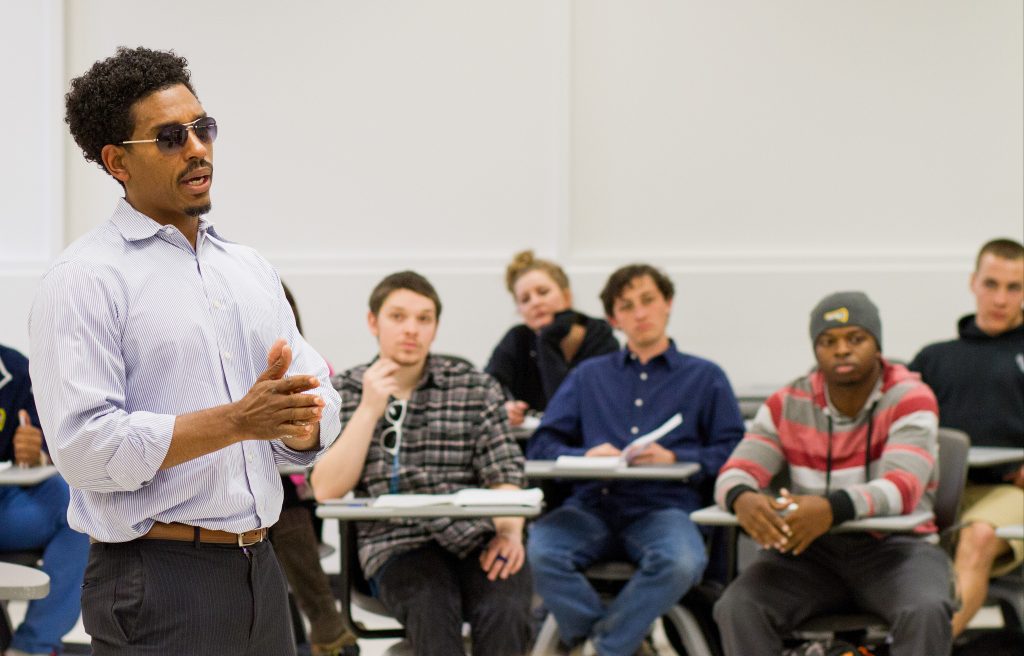By Heidi Toth
NAU Communications
2018 is a seminal anniversary in the American Civil Rights movement—the 50th anniversary of the signing the Civil Rights Act of 1968, protests by black students at major universities, the Memphis sanitation workers’ strike and, on April 4, the anniversary of the assassination of The Rev. Martin Luther King Jr. in Memphis.
Frederick Gooding Jr, an ethnic studies professor at Northern Arizona University who researches and teaches African-American history and critical race theory, talked about King’s contributions to the fight for civil rights and the importance of Americans today to continue working toward the dream he shared in his well-known 1963 speech. He also spoke at the breakfast the Black Student Union held on Martin Luther King Day.
What do you think was Martin Luther King Jr.’s biggest accomplishment?
I think what he did was he changed with the times, and I think that’s often overlooked. What the media did—the media in mainstream America has seized upon four words that have essentially served to ensconce him within human history. They’re very inspirational words, but I think he was a bit more than an aspirational dream. He was a practical person who was very much involved with the pulse of the people.
He was vocal about his anti-war stance and economic critique of America. He does make reference in his “I have a dream” speech to the promissory note coming back insufficient funds, and later in his career he shares a message of rights of marginalized blue-collar workers who happen to be black. He’s leaning toward a more socialized stance. He stayed in the slums in Chicago to bring light to fact that people are living on the same planet but in different worlds.
I think oftentimes people stop the picture in 1963. It’s beautiful picture, it’s inspirational, but the 5-year period after that shows he was still evolving in ways many of us need to. It’s easy to hold hands on Jan. 15 every year and talk about what a great job he’s done and then take our foot off the gas for rest of the year.
If anything, his progression indicated that we should do the same.
Which speech stands out most to you?
The last speech he ever gave. Go look it up on YouTube and see how you would characterize the tone. It was the night before he was assassinated. Assess that tone and compare and contrast it to cuddly teddy bear image of his “I have a dream” speech.
It’s eerie also in that it is perhaps—It was almost like he had a premonition that “I may not make it there with you to the idea of promised land.” I don’t know if he saw that it was imminent, that it would be the next afternoon, but more the idea that we have so much work to do. He’d been out of the spotlight, the buzz of the Nobel Peace Prize was worn off, and he was trying to bring light and attention to poor people.
This idea that “I may not make it there with you is perhaps an ominous sign as well. It’s not just in terms of he himself, but the idea that wow, there is so much work to be done.
How is his legacy part of today’s conversation?
In many senses, it simplifies it. We get the day off, but sadly, many schools don’t really do much to recognize it. It’s almost taken for granted. In the early ‘80s, many states were still considering whether to adopt it as federal holiday, and there was a lot of activism around it. Stevie Wonder wrote a song, and it was typical at elementary or middle school level to have programs about Martin Luther King. Now it’s just another three-day weekend.
What should people today learn from Martin Luther King’s life and his mission?
We should learn that he’s one individual who helped fight the good fight and it’s going to take more than one individual. If you look at 50 years since then, some things have changed, but not everything. We thought more would have changed by now two and a half generations later.
Some people do point to President Obama as positive proof, but Obama was one individual. There’s still an operation in place. It has changed, but the question is to what degree. By the metrics of poverty, homelessness, joblessness, education, life expectancy, those numbers unfortunately have been relatively consistent when it comes to blacks being at the bottom. The LeBron James, the Oprahs of the world—they’re the exception.
Even in the 1920s, at the height of Jim Crow when black people were hung from trees, there was a black millionaire. There’s always an exception to the rule, but the question is what is the rule.
Who today is carrying on MLK’s mission?
That’s a problematic question, and I’m going to push back. Again, it’s not one individual. This is a nation of 300-plus million people, and it can’t be reduced to one individual. That’s disingenuous. This narrative carried on that King was the leader, and once he was taken out things fizzled. People have always been resisting—before King came and after. In local government, high schools and the lumberyard, people have always been fighting for humanity.
I think what’s interesting is to see development of Black Lives Matter because this movement doesn’t necessarily have a figurehead, and that’s been frustrating for some—who can we talk to, who takes the blame, who’s responsible? There’s a myriad of different individuals from different places, though the critique may be that not well-positioned to advance agenda.
The question is how will social movements evolve in terms of race and ethnicity? Time will tell. The multiplicity of Black Lives Matter as one example might give a hint that maybe we should not be asking who.



